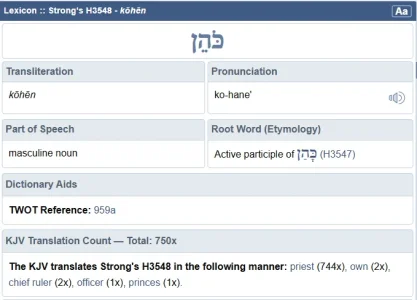Well, darn... I only found 18 versions the other way:
ESV: Benaiah the son of Jehoiada was over[fn] the Cherethites and the Pelethites, and David’s sons were priests
NLT: Benaiah son of Jehoiada was captain of the king’s bodyguard.[fn] And David’s sons served as priestly leaders
NIV: Benaiah son of Jehoiada was over the Kerethites and Pelethites; and David’s sons were priests
LSB: Benaiah the son of Jehoiada [fn]was over the Cherethites and the Pelethites; and the sons of David were [fn]priests.
NET: Benaiah son of Jehoida supervised the Kerithites and Pelethites; and David's sons were priests
RSV: Benai'ah the son of Jehoi'ada was over the Cher'ethites and the Pel'ethites; and David's sons were priests
BSB: Benaiah son of Jehoiada was over the Cherethites and Pelethites; and David’s sons were priestly leaders.
CEV: Benaiah the son of Jehoiada was the commander of David's bodyguard. David's sons were priests.
ERV: Benaiah the son of Jehoiada was over the Cherethites and the Pelethites; and David's sons were priests.
GTW: Jehoiada's son Benaiah was commander of the Cherethites and the Pelethites. And David's sons were priests.
GNT: Benaiah son of Jehoiada was in charge of David's bodyguards; and David's sons were priests.
ISV: Jehoida's son Benaiah supervised the special forces and mercenaries, and David's sons were priests.
SLT: And Benaiah, son of Jehoiada, and the Cherethites and the Pelethites: and the sons of David were priests.
CPDV: And Benaiah, the son of Jehoiada, was over the Cherethites and Pelethites. But the sons of David were priests.
NAB: Benaiah, son of Jehoiada, was in command of the Cherethites and the Pelethites; and David’s sons were priests.
NRSV: Benaiah son of Jehoiada was over the Cherethites and the Pelethites; and David’s sons were priests.
VUL: Banaias autem filius Ioiada super Cherethi et Felethi filii autem David sacerdotes erant
Oh... plus the original Hebrew text. That one's not a translation, but it seems kinda important.


